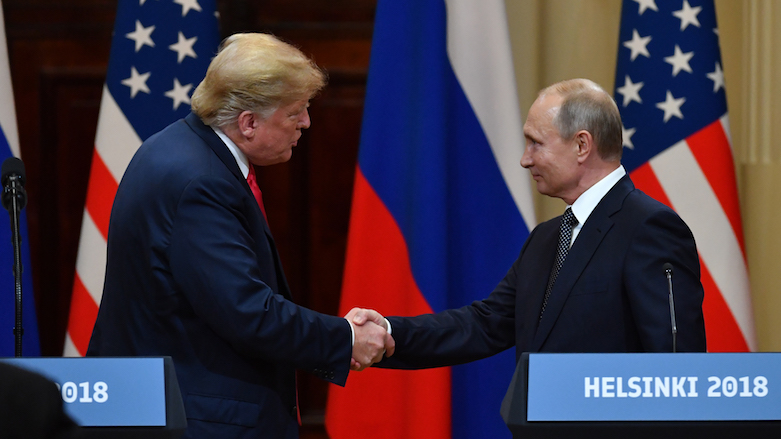Status quo remains in Rojava after US-Russia summit, but longer term uncertain

WASHINGTON DC (Kurdistan 24) – Following Monday’s summit between US President Donald Trump and Russian President Vladimir Putin, it appears that the current political situation in Syrian Kurdistan (Rojava) will continue as it is for the time being, although prospects for the longer-term are unclear.
The Kurdish led Syrian Democratic Forces (SDF) now control northeast Syria, where they have been working with US and French troops to fight the Islamic State (IS), now nearly, but not completely, defeated in Syria.
In introductory remarks at the press conference that followed the Helsinki summit, Trump noted that he and Putin had discussed Syria “at length” in their two-hour tete-a-tete (translators were present, but no aides).
Subsequently, a reporter from Russia Today (RT) asked Trump, “Would you please go into details, if possible,” on “any specific arrangements” you concluded “to work together with Russia” in Syria?
Trump replied, “We’ve worked with Israel long and hard for many years, many decades,” adding, “never, never has anyone, any country been closer than we are” now.
“President Putin also is helping Israel, and we both spoke with [Prime Minister] Bibi Netanyahu,” Trump continued.
Trump did not answer the question! So the RT reporter tried again, “For now, no specific agreements, for instance, between the militaries?”
Trump’s response was no clearer, and Putin intervened to explain he had discussed “humanitarian” issues with Trump, as he had done on Sunday, when French President Emmanuel Macron visited Moscow to celebrate France’s World Cup victory.
“We reached an agreement that, together with European counties, including France, we will step up this effort,” Putin stated. Russia will provide military transport places to deliver the humanitarian supplies, he said.
“The crucial thing,” Putin continued, “is the huge amount of refugees”—in Turkey, Lebanon, and Jordan. “If we help them,” that will decrease “the migration pressure” on Europe.
Over the past months, Trump has said that he wants US troops to leave Syria “very soon.” But if the US leaves Syria abruptly, Iran, which has a substantial military presence in the country, will fill the vacuum.
At the press conference, Trump affirmed that the US “will not allow Iran to benefit from our successful campaign against [IS].” However, the idea has emerged that Washington might turn to Moscow to restrain Iran in Syria.
Israeli Prime Minister, Benjamin Netanyahu is among the advocates of such a view, and he has met Putin nine times since September 2015, when Russia’s intervention in Syria began. Indeed, before Netanyahu’s last visit to Moscow, Sen. Lindsey Graham (R., South Carolina) cautioned, “To our friends in Israel – be very careful making agreements with Russia re Syria that affect US interests.”
The “US must maintain presence in Syria to ensure [IS] doesn’t come back and to counter Russia/Iran influence,” Graham, who recently visited Manbij, affirmed.
Yet as The Washington Post’s Josh Rogin warned shortly before Monday’s summit, Trump was considering just such a “dangerous” agreement.
The administration is divided on the issue, with two State Department officials—David Satterfield, Acting Assistant Secretary of State for Near Eastern Affairs, and Brett McGurk, Special Presidential Envoy to the Global Coalition to Defeat IS—arguing in favor, but other State Department, Pentagon and National Security Council officials “deeply skeptical.”
If the US did reach such a deal with Russia, it would expect the SDF to conclude an understanding with the Syrian regime, perhaps with Moscow’s assistance.
Paul Davis, a former Pentagon analyst of Kurdish affairs and currently a Fellow at Soran University, advised Kurdistan 24 that Trump’s reluctance to answer RT’s questions on Syria suggests that something sensitive was discussed, but it is impossible to know what it was or if anything had been decided.
Representatives from the US and Russian national security councils will follow up on the issues that Trump and Putin discussed, which also include nuclear proliferation, Iran’s nuclear ambitions, and North Korea.
For now, it does not appear there will be any fundamental change to the US military posture in Syria. However, it is difficult to know what will happen over the course of the next year. Trump would like to withdraw US forces from Syria, but he faces strong opposition from his own advisers.
Only US and Russian journalists were allowed into the press conference. That would have done little to address the concerns of others, including Kurds, that Washington and Moscow might be concluding deals at their expense.
However, Kurdistan 24 spoke with Jouni Mölsä, an official with Finland's Foreign Minister, who explained that Finland has a long history of hosting such events.
They include the 1975 conference on Security and Cooperation in Europe that produced The Helsinki Accords, which ultimately helped bring about the collapse of Communism, and the 1997 summit between US President Bill Clinton and Russian President Boris Yeltsin.
